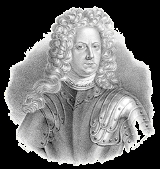
Carl Gustav Rehnskiöld
Encyclopedia
Count Carl Gustav Rehnskiöld (6 August 1651 - 29 January 1722) was a Swedish
Field Marshal
under the command of King Charles XII of Sweden. Despite being choleric and irritable, Rehnskiöld's military skills made him the chief military advisor and second-in-command to King Charles and earned him the epithet the "Parmenio of the Northern Alexander."
as a son of Gierd Antoni Rehnskiöld and Birgitta Torskeskål.
During his life, he played an important role in the Great Northern War
. He commanded at the Battle of Fraustadt
, after which King Charles XII made him a Field Marshal
and Count. Highlights of his career include a highly successful campaign against Poland from 1701-1703, and the disastrous Ukrainian campaign which ended with the Battle of Poltava
in 1709. The Battle was a disaster for the Swedish army and Rehnskiöld was captured by the Russians
. He remained in Russian captivity until 1718.
One of the most successful Swedish Generals of his time, he nonetheless paved the way for the rise of Russian military power, and the fall of the Swedish military might.
Sweden
Sweden , officially the Kingdom of Sweden , is a Nordic country on the Scandinavian Peninsula in Northern Europe. Sweden borders with Norway and Finland and is connected to Denmark by a bridge-tunnel across the Öresund....
Field Marshal
Field Marshal
Field Marshal is a military rank. Traditionally, it is the highest military rank in an army.-Etymology:The origin of the rank of field marshal dates to the early Middle Ages, originally meaning the keeper of the king's horses , from the time of the early Frankish kings.-Usage and hierarchical...
under the command of King Charles XII of Sweden. Despite being choleric and irritable, Rehnskiöld's military skills made him the chief military advisor and second-in-command to King Charles and earned him the epithet the "Parmenio of the Northern Alexander."
Biography
Rehnskiöld was born in StralsundStralsund
- Main sights :* The Brick Gothic historic centre is a UNESCO World Heritage Site.* The heart of the old town is the Old Market Square , with the Gothic Town Hall . Behind the town hall stands the imposing Nikolaikirche , built in 1270-1360...
as a son of Gierd Antoni Rehnskiöld and Birgitta Torskeskål.
During his life, he played an important role in the Great Northern War
Great Northern War
The Great Northern War was a conflict in which a coalition led by the Tsardom of Russia successfully contested the supremacy of the Swedish Empire in northern Central Europe and Eastern Europe. The initial leaders of the anti-Swedish alliance were Peter I the Great of Russia, Frederick IV of...
. He commanded at the Battle of Fraustadt
Battle of Fraustadt
The Battle of Fraustadt was fought on February 2, 1706 / February 3, 1706 / February 13, 1706 between Sweden and Saxony-Poland and their Russian allies near Fraustadt in Poland. During the Battle of Fraustadt on February 3, August II was only 120 kilometers away with a cavalry force about 8000...
, after which King Charles XII made him a Field Marshal
Field Marshal
Field Marshal is a military rank. Traditionally, it is the highest military rank in an army.-Etymology:The origin of the rank of field marshal dates to the early Middle Ages, originally meaning the keeper of the king's horses , from the time of the early Frankish kings.-Usage and hierarchical...
and Count. Highlights of his career include a highly successful campaign against Poland from 1701-1703, and the disastrous Ukrainian campaign which ended with the Battle of Poltava
Battle of Poltava
The Battle of Poltava on 27 June 1709 was the decisive victory of Peter I of Russia over the Swedish forces under Field Marshal Carl Gustav Rehnskiöld in one of the battles of the Great Northern War. It is widely believed to have been the beginning of Sweden's decline as a Great Power; the...
in 1709. The Battle was a disaster for the Swedish army and Rehnskiöld was captured by the Russians
Russians
The Russian people are an East Slavic ethnic group native to Russia, speaking the Russian language and primarily living in Russia and neighboring countries....
. He remained in Russian captivity until 1718.
One of the most successful Swedish Generals of his time, he nonetheless paved the way for the rise of Russian military power, and the fall of the Swedish military might.

